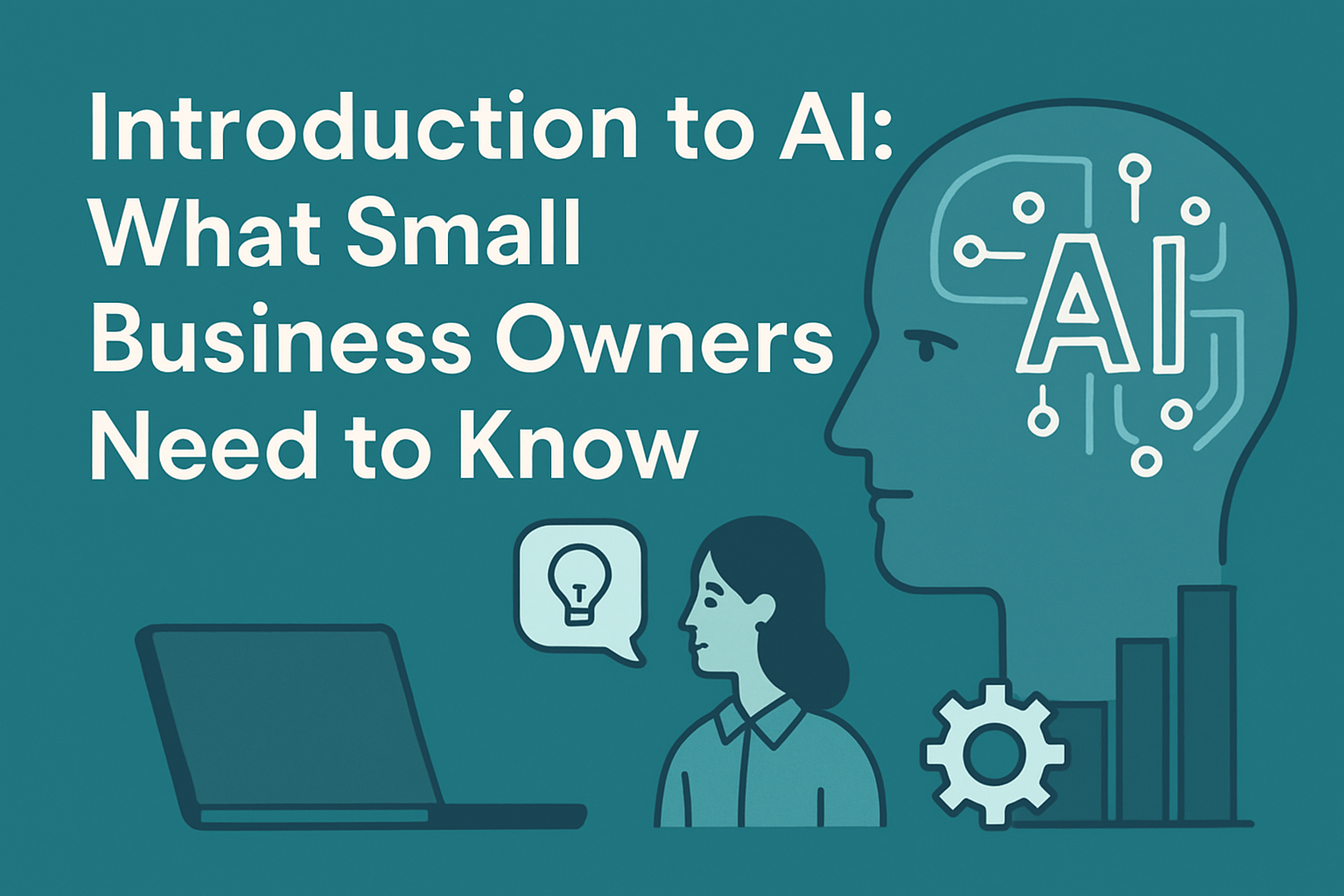Introduction To AI: What Small Business Owners Need To Know
Artificial Intelligence, or AI, isn’t just a buzzword that’s floating around these days. It’s revolutionizing how businesses operate, especially for small businesses looking to keep up or even stand out.
When diving into what AI actually is, it’s important to dispel the sci-fi notion. At its core, AI refers to systems or machines that mimic human intelligence, performing tasks and improving themselves based on the information they collect. It’s like having a super-smart assistant that can learn and adapt over time.
AI’s evolution in the marketplace has been rapid, moving from simple automation to complex decision-making support systems. This speed can make it feel daunting, but it’s also what makes AI so valuable. It’s opening doors to efficiencies and innovations that weren’t possible a few years ago.
So, how do you separate the wheat from the chaff? Not all AI solutions are created equal. You want tools that genuinely provide value rather than just jumping on the bandwagon. Useful AI offers genuine efficiencies and profit improvements, rather than flashy gimmicks that don’t really deliver.
Now, should you be taking this all seriously in your industry? Most likely, yes. AI’s impact varies across sectors, but ignoring it could mean missing out on enhanced productivity, cost savings, or new business opportunities. Whether AI is a game-changer or a passing trend often depends on how strategically and creatively it’s implemented in your specific business context.
Deciding If AI Is Right for Your Business
Determining if artificial intelligence fits into your business puzzle isn’t always straightforward. It’s crucial to reflect on what your business truly needs before diving into AI or any new tech for that matter. A solid starting point is identifying specific pain points or areas where things could flow smoother. This could range from customer service to logistics or even lead generation.
Common areas where AI shines include automating repetitive tasks, offering deep insights from data, and enhancing customer interactions. If your business struggles with time-consuming processes or has data sitting idle, AI might just be the tool you need.
One of the biggest concerns business owners voice is the fear of AI replacing their workforce. But the real beauty of AI lies in its ability to complement and enhance what your team can achieve. Think of AI as a tool that boosts efficiency, allowing your team to focus on what they’re truly great at – creative or strategic tasks.
Is AI aligned with your business goals and model? This is a crucial question. If your enterprise aims for agility and innovation, integrating AI can foster these ideals by streamlining operations and offering fresh insights to power decision-making.
Before committing, consider running smaller pilot projects to see how AI performs in your setting without over-investing right off the bat. It’s all about finding the right fit and seeing tangible benefits before going all in.
Roadmap to AI: Getting Started Without Overwhelm
Starting small with AI can make a giant leap without causing chaos in your operations. You don’t need to be a tech wizard or have a massive budget to get started. Begin by identifying areas with clear-cut improvements. For instance, automating customer service with chatbots can improve response time and free up your team’s schedule.
There are a plethora of user-friendly AI tools designed with small businesses in mind. From free apps to budget-friendly solutions, these tools can help automate scheduling, enhance data analysis, or refine marketing strategies. It’s about finding tools that fit your needs without breaking the bank.
Speaking of budgets, how much should you actually allocate? It really hinges on your business’s size and specific needs. Often, accessible AI solutions come without costly upfront investments. Instead, consider monthly subscriptions or pay-as-you-go services which keep expenses manageable.
Remember, not every AI application needs to revolutionize your entire process. Sometimes, incremental changes, like using AI for simple invoicing or improving website analytics, can have significant impacts over time.
Starting small gives you the advantage of learning and adapting. This approach allows you to manage the change comfortably, seek feedback, and gradually scale up based on what works best for your business.
Leveraging AI to Boost Business Growth
AI holds the power to fuel business growth in ways which can be surprisingly accessible. Sales and marketing often see immediate benefits through well-implemented AI. Whether it’s using predictive analytics to understand customer behaviors or personalizing email campaigns, AI can help hone in on what truly drives sales.
On the operations side, AI can cut back on inefficiencies, giving you back precious time and resources. Imagine AI managing your stock levels or scheduling your workforce more effectively—tasks that sound simple, but can save a ton when AI steps in to optimize them.
Customer service is another clear winner in the AI game. With AI, you can offer 24/7 customer support, instant solutions to common queries, and even personal touches through data-driven insights. All these aspects contribute to a smoother customer journey and happier customers.
Real-world examples speak for themselves. Consider the local bakery that uses AI to predict demand patterns for batch baking, minimizing waste while always meeting customer demand. Or the marketing firm that leverages AI for sharper customer segmentation, leading to highly effective ad campaigns.
While each business’s experience with AI will vary, the goal remains the same: better results, more efficiently. It’s about using AI smartly to grow sustainably, focusing on areas that will see the most impact.
Risks and Rewards: What If You Ignore AI?
Ignoring AI might not seem like a big deal, especially if things are running smoothly in your corner of the world. But there’s a real risk of missing out on opportunities that can supercharge your business. Whether it’s boosting productivity or cutting costs, AI’s benefits are tangible and significant—if you decide to take the plunge.
Looking around at competitors might give you the nudge you need. If they’re using AI and you’re not, they might be making strides that could leave you lagging behind. AI offers a competitive edge by providing access to insights and efficiencies that weren’t previously available.
The risk isn’t just about efficiency, though. It’s about staying on top of industry standards. More and more sectors are seeing AI as the norm, not the exception. Without an AI strategy, you could end up as the odd one out, whether it’s in terms of tech adoption or customer expectations.
The good news is that exploring AI doesn’t have to be a risky, all-or-nothing venture. It’s about thoughtfully considering how AI fits into your business, not just for today, but as a foundation for future growth.
Avoiding Common Mistakes with Business AI
The path to integrating AI isn’t without its hiccups. A common error many businesses fall into is diving headfirst into AI without a clear strategy, leading to wasted resources and unmet expectations. Before you invest in AI, outline clear objectives for what you want to achieve—be it time savings, increased sales, or enhanced customer service.
There’s also the allure of shiny new tech, packed with promises and buzzing with hype. Not every AI tool is right for every business. Focus on finding solutions that align with your specific needs. Marketing fluff can blur the real benefits, so it’s essential to critically assess AI products before jumping on board.
When taking the AI plunge, some businesses overlook the importance of training their staff. No one tool can replace the human touch entirely, and well-trained employees can leverage AI to amplify their strengths significantly. Staff should be given the time and resources needed to learn and embrace AI systems for smooth integration.
Bringing in outside expertise can help steer clear of these pitfalls. Consultants or workshops can provide the guidance needed, ensuring you’re not just implementing AI but doing so strategically and cost effectively.
The Future of AI: What’s Next for Small Businesses?
Looking ahead, AI is poised to become even more intertwined with everyday business activities. Emerging trends suggest more targeted, industry-specific AI solutions, allowing small businesses to adopt tools tailored precisely to their operational needs.
Keeping pace with these advancements is key. The tech landscape shifts rapidly, and staying informed will help ensure your business isn’t caught off guard. Consider subscribing to tech news, attending webinars, or joining industry groups that focus on AI advancements.
Future AI tools are likely to become even more user-friendly, with simpler interfaces and more powerful results. This means less time grappling with tech and more time leveraging its power. AI’s future is about making things easier for you and your team while driving real results.
To capitalize on future developments, create a culture of learning and openness to change in your team. Encouraging tech exploration and innovation can position your business to quickly test and adopt new tools that offer genuine benefits.
Ultimately, staying adaptive and ready to evolve can keep your business at the forefront of what’s next. The future of AI is bright, and for those eager to embrace it, the opportunities are limitless.


